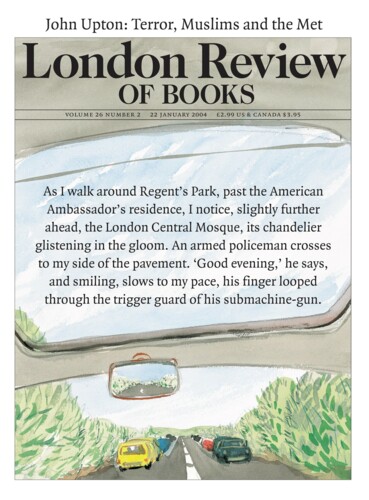On the Steps of the National Gallery
I am on my way in to destroy Poussin’s Landscape with a Man Killed by a Snake.
I know what I am doing, believe me. When it has ceased to be part of our world
We shall go without tragedy, and forget why we followed
In the running man’s footsteps day after day, round the corner to the light.
Once it is over
There will be no more choking and spluttering in the black stream,
Feeling the creature’s glistening inner tube tightening at our throats;
No more soft explosions of hair in water – Diderot’s electric, scintillating extension of self,
His thread of atoms glittering with static! –
All senseless and endless as we are shown it, top heavy, twisted in fetters,
Dragged along in the current squeezed sentimentally from the rock.
Dawn must not be our metaphor, you understand. (The young man leans closer
So I get the spray of his sibilants in my face. But his voice is familiar, gentle.)
I have found a way to get free from the half-hour of futurity, he tells me, and look daylight in the face –
Even the tombstone grey of London in February, which we call on rain to deliver us from!
We shall make a space. (He has reached the first pillar of the portico now, half turning
towards the cold square.)
There will be no stream winding out of sight in the landscape I have in mind for you –
everything will be visible for ever –
No balance, no level lake, no human care, no hands reaching out to sign and soothe,
Only the rumble of the excluded at the chained front gate, the snake standing upright,
The mob in the closing scene of Marino Faliero, straining (and failing) to catch the rabblerouser’s last words.
Landscape with a Man Killed by a Snake
‘Presentiment – is the long Shadow – on the Lawn –’
Actual encounter, says Poussin
(Replying to Dickinson’s shadow)
Is the hardness of light coming over the hill
Drawing the curtain on last night’s horrors,
Making the castle a house of cards,
The streambed an ossuary, the lake a dead parody of the sky.
But only incidentally, is the message – for as long as we look
And reach out to stop the alarm;
For as long as ‘hardness’ takes to say and see
As part of the human condition slash comedy:
The careless, the decent, the smell of moss,
The professional stretcher party
With the odd philosopher in tow, natch.
Félibien’s Dream
Bien qu’il affectât d’être fort retiré quand il travaillait . . . je vivais néanmoins de telle sorte avec lui, que j’avais toujours la liberté de le voir peindre. Et c’était pour lors que joignant la pratique aux enseignements, il me faisait remarquer en travaillant, & par une sensible démonstration, la vérité des choses qu’il m’apprenait par ses discours.
Félibien, Entretiens
He gave me a demonstration. I remember him turning the palette towards me and saying
Suppose that the blues in their usual order by my thumb had no emotion attached to them,
And as I employed them were neutral. (No standing at the crossroads smelling fire on the wind!)
They would be the blue of the water on this mild night,
Colour as the form of a thought or the consistency of an argument
In which laws, moods and commitments were suspended like specimen ghosts.
Do you see the light coming through the liquid in the bell jar, taking advantage of its flaws?
Is that sensible, do you think? Negligible? Does the world appear there as the two of us understand it?
I thought it did. Then in the dream the world in the water changed,
Puffs of mud spurted from under the cattle’s feet and their pace quickened
Almost to a canter; the line of roofs tilted, and from the terrace came a burst of laughter,
Maybe a scream. An unknown god took his place on the mountaintop
And a huge despair at the sight of him – after all we had done, after years of respite –
Spread through the streets and squares. People packed up their stalls to go.
But of course, he said. The blues are provisional, not preventive.
Any fool can see that the sky in the lake is empty. That was my way of saying
That painting is a false alternative – some years ago I noticed how many false things
I had accepted as true in my childhood – but that all alternatives are preferable
To the clod of earth in my handkerchief. (But that clod too I like,
It has the smell of pasture and the profile of a high cliff.)
The sky in the lake is simplified, yes. All the better for the unknown god
To lean over and use as a mirror, picking last night’s flesh from his teeth.
Send Letters To:
The Editor
London Review of Books,
28 Little Russell Street
London, WC1A 2HN
letters@lrb.co.uk
Please include name, address, and a telephone number.

